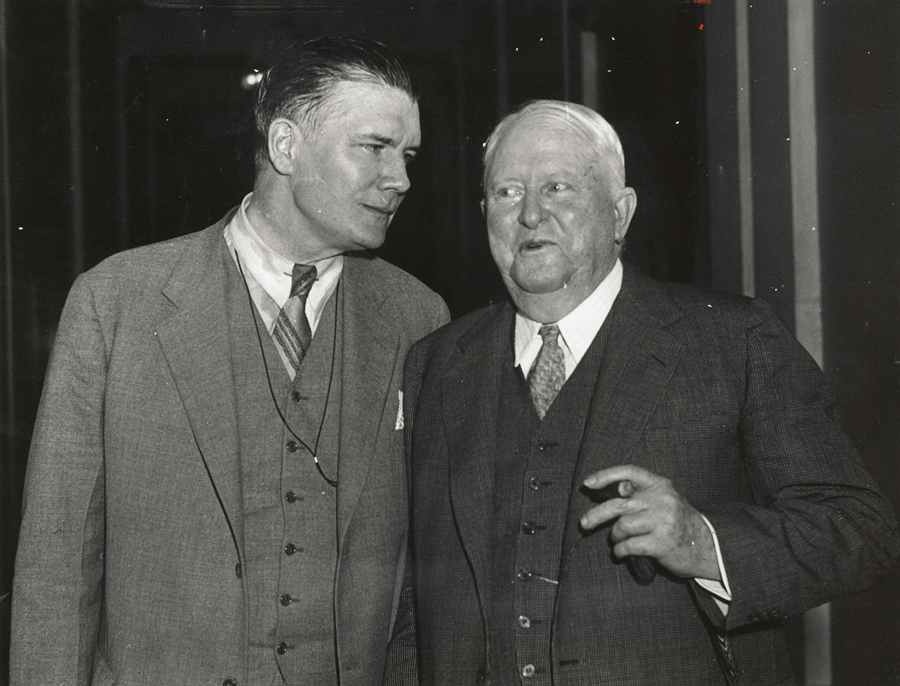
AFL-CIO President Richard Trumka didn’t pull punches when he announced Aug. 15 that he and Thea Lee, former AFL-CIO deputy chief of staff, were exiting President Donald Trump’s American Manufacturing Council.
"We cannot sit on a council for a president who tolerates bigotry and domestic terrorism," Trumka said in a statement. "President Trump’s remarks [last Tuesday] repudiate his forced remarks [last Monday] about the KKK and neo-Nazis. We must resign on behalf of America’s working people, who reject all notions of legitimacy of these bigoted groups."
Today, the North Dakota AFL-CIO posted a statement on its website pledging that the federation "will always stand against such racist, hateful and vile beliefs. Nazism, fascism and white supremacy are abhorrent to everything labor stands for and they always have been."
The statement, written by North Dakota AFL-CIO President/Secretary-Treasurer Waylon Hedegaard, pointed out that "one of the Nazis’ first acts in Germany was to crush the labor unions. Knowing that organized labor was a real threat to Nazi control, the fascist government spent two years outlawing unions, jailing leaders who stood up for workers and setting up a state-run system of worker control. Using ruthless violence, intimidation and murder, the Nazis destroyed everything unions had fought for."
The Ku Klux Klan hates unions, too, because in a union everybody is equal.
Trumka added: "It’s clear that President Trump’s manufacturing council was never an effective means for delivering real policy that lifts working families, and his remarks [last Tuesday] were the last straw. We joined this council with the intent to be a voice for working people and real hope that it would result in positive economic policy, but it has become yet another broken promise on the president’s record. From hollow councils to bad policy and embracing bigotry, the actions of this administration have consistently failed working people."
No legislation has failed working people more than "right to work" laws. Trump ran on a platform with a plank supporting "the right of states to enact right to work laws and calling for a national right to work law." On the campaign trail, Trump said he preferred right to work states to non-right to work states.
Naturally, the Republicans would prefer that the racist roots of right to work not be exposed.
"The drive for such laws was fueled by Texas businessperson and white supremacist Vance Muse, who despised the doctrine of human equality represented by unions," wrote Roger Bybee in The Progressive.
Muse, a Klan fan, was "the Karl Rove-meets-David Duke brains behind the whole right to work movement," wrote Mark Ames.
Under a right to work law, workers at a union shop can enjoy union-won wages and benefits without joining the union or paying the union a service fee to represent them. The idea is to weaken strong unions, destroy small unions and keep workers from organizing.
The Texas Legislature passed a right to work law in 1947 but changed the measure to its current form in 1993.
Muse, who also was rabidly anti-Semitic, saw right to work as a twofer: Right to work would help smash unions and help maintain segregation and white supremacy in Texas and elsewhere in the Jim Crow South. Without right to work, "white women and white men will be forced into organizations with black African apes whom they will have to call ‘brother’ or lose their jobs," he harangued.
In 1936, Muse started the reactionary, racist Christian American Association in opposition to President Franklin D. Roosevelt’s New Deal. Muse allied the group with the KKK. FDR was running for re-election and Muse bitterly opposed him.
The year before, a Democratic Congress passed the National Labor Relations Act. Also known as the Wagner Act, the legislation gave workers legal protection to organize and bargain collectively.
"The appallingly racist views of Muse and his Christian American Association coincided with the mentality of corporate managers dedicated to holding down wages and maintaining the tight control over workers dating back to the days of slavery," Bybee wrote. "The CEOs of the 1930s recognized that Muse’s segregationist ‘right to work’ concept would break up unified worker efforts to claim the rights granted under the 1935 National Labor Relations Act."
Dr. Martin Luther King Jr. also recognized the racist origins of right to work.
"In our glorious fight for civil rights, we must guard against being fooled by false slogans, such as 'right to work,'" he warned in 1961. "It is a law to rob us of our civil rights and job rights. Its purpose is to destroy labor unions and the freedom of collective bargaining by which unions have improved wages and working conditions of everyone….Wherever these laws have been passed, wages are lower, job opportunities are fewer and there are no civil rights. We do not intend to let them do this to us. We demand this fraud be stopped. Our weapon is our vote."
Also in 1961, Dr. King told the AFL-CIO Convention, "Our needs are identical with labor's needs—decent wages, fair working conditions, livable housing, old age security, health and welfare measures, conditions in which families can grow, have education for their children and respect in the community. That is why Negroes support labor's demands and fight laws which curb labor.
"That is why the labor-hater and labor-baiter is virtually always a twin-headed creature spewing anti-Negro epithets from one mouth and anti-labor propaganda from the other mouth."
This guest post from Berry Craig originally appeared at Kentucky State AFL-CIO.

